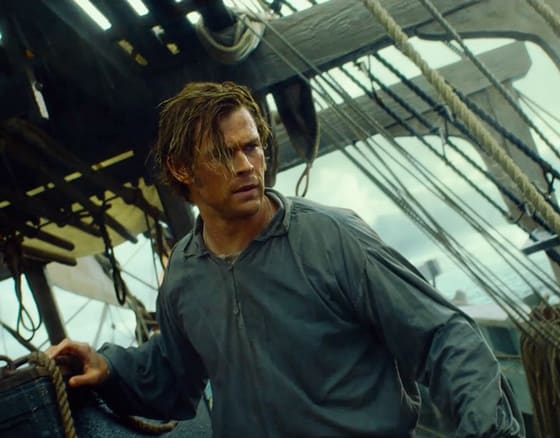It's difficult to watch Ron Howard's In the Heart of the Sea and not think of it as a victim of unfortunate timing. While it's being released weeks ahead of The Revenant, another 19th century tale of survival that pits man against nature, Howard's film can't help but come across as a more sanitized and generic portrayal of pushing the human body to its limits. It's certainly well-constructed by the reliable Howard and has its share of awe-inspiring moments, but it's ultimately bogged down by a paint-by-numbers script that deals in all the clumsy characterizations and hollow sentimentality of a Heritage Minutes short.
This historical account concerns The Essex, a whaling vessel out of Nantucket, Massachusetts that sets sail in search of a large haul of whale oil to satisfy its owners in 1819. They've hired Owen Chase (Chris Hemsworth) as its first mate — a modest man with an expecting wife at home — despite the fact that he was promised a captaincy aboard the ship. This creates immediate friction with The Essex's actual captain, George Pollard (Benjamin Walker), a thinly sketched adversary with an air of pomposity who was born into the line of work, unlike the more seasoned Chase.
After first encountering a devastating storm and then finding far too few whales to satisfy their lofty ambitions, the ship's crew get wind of a gargantuan whale that just might make their entire trip worthwhile. But when they finally happen upon the unmistakable beast, they learn that some creatures are probably best not disturbed and soon find themselves aboard a sinking ship, fighting for their lives.
This is all told using an unfortunate framing device that sees author Herman Melville (Ben Whishaw) getting all the details from a reluctant old man (Brendan Gleeson) who was among the ship's crew as a young lad. Aside from the fact that this tired structure seems to only be employed here to make the underwhelming suggestion that The Essex's demise was the basis for Melville's Moby Dick, it also proves rather intrusive, with Melville's attempts to get the elderly man to be forthright about his experience consistently slowing any gathering momentum.
Still, the movie comes to the life in the ship's encounters with the impressive whale, using seamless effects to show its size and the extreme force it's capable of generating with only a flick of its tail. It may strain believability when the whale inevitably earns comparisons to Jaws in the lengths it's willing to go to wreak havoc on the ship and its doomed crew, but it's likely that these tremendous spectacles will be the only thing remembered about the film in time.
Although there are obvious cases where two films with similar subject matter are made almost solely to compete with another, it seems to be more of a case of dumb luck here that these two projects were developed and then brought to screen concurrently. Even so, In the Heart of the Sea arrives as a lesser Deep Impact to the upcoming The Revenant's superior Armageddon.
(Warner)This historical account concerns The Essex, a whaling vessel out of Nantucket, Massachusetts that sets sail in search of a large haul of whale oil to satisfy its owners in 1819. They've hired Owen Chase (Chris Hemsworth) as its first mate — a modest man with an expecting wife at home — despite the fact that he was promised a captaincy aboard the ship. This creates immediate friction with The Essex's actual captain, George Pollard (Benjamin Walker), a thinly sketched adversary with an air of pomposity who was born into the line of work, unlike the more seasoned Chase.
After first encountering a devastating storm and then finding far too few whales to satisfy their lofty ambitions, the ship's crew get wind of a gargantuan whale that just might make their entire trip worthwhile. But when they finally happen upon the unmistakable beast, they learn that some creatures are probably best not disturbed and soon find themselves aboard a sinking ship, fighting for their lives.
This is all told using an unfortunate framing device that sees author Herman Melville (Ben Whishaw) getting all the details from a reluctant old man (Brendan Gleeson) who was among the ship's crew as a young lad. Aside from the fact that this tired structure seems to only be employed here to make the underwhelming suggestion that The Essex's demise was the basis for Melville's Moby Dick, it also proves rather intrusive, with Melville's attempts to get the elderly man to be forthright about his experience consistently slowing any gathering momentum.
Still, the movie comes to the life in the ship's encounters with the impressive whale, using seamless effects to show its size and the extreme force it's capable of generating with only a flick of its tail. It may strain believability when the whale inevitably earns comparisons to Jaws in the lengths it's willing to go to wreak havoc on the ship and its doomed crew, but it's likely that these tremendous spectacles will be the only thing remembered about the film in time.
Although there are obvious cases where two films with similar subject matter are made almost solely to compete with another, it seems to be more of a case of dumb luck here that these two projects were developed and then brought to screen concurrently. Even so, In the Heart of the Sea arrives as a lesser Deep Impact to the upcoming The Revenant's superior Armageddon.
